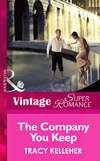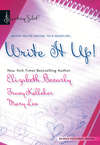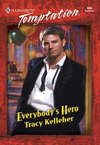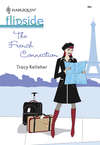Czytaj książkę: «The Company You Keep»
When the opposition is too delicious to ignore!
Running slam-dunk into Vic Golinski at her college reunion leaves Mimi Lodge with a lot of questions. Back in the day, they were Grantham University’s star athletes and polar opposites. If she said left, he said right. If he said hot, she said cold. All of that opposition had an unexpected consequence: a heated attraction….
So will she and Vic still clash like the fiercely competitive jocks they once were? Life might have softened their beliefs, but clearly that incredible chemistry is still there. As the reunion unfolds every meeting is a study in grown-up lust—and restraint—as they decide where these exhilarating feelings are taking them.
“There’s something between you and me.”
Vic smiled. “Although I’ve always thought we were completely wrong for each other.”
“Maybe we’re actually attuned to each other in ways unimaginable?” Mimi suggested.
“Oh, I can imagine all right,” he said teasingly. They continued to shift and sway as they stood there in the moonlight. Their faces close, so close to contact, but not quite.
Mimi felt giddy, felt herself tremble. “You know what they say? Opposites attract.” She grabbed his finger when he pointed it at her. She felt possessive.
He looked at her hand on his. “Why’d you do that?”
Because she wanted him. “Because you shouldn’t point at people,” she answered instead.
“You’re teaching me manners now?” He angled his head one more time and brought his lips near hers.
She angled her head the other way, but kept their mouths only an inch apart. “So, is this where you assert your manliness and kiss me?”
“Bossy, too.” He put his hands on her waist. Drew her hips to his.
And that was the type of assertion she wanted from him.
Dear Reader,
When I was in college, I was a jock—not the first thing most romance writers tell you.
I was a member of the varsity women’s crew at Yale University, and in my junior year was elected captain. But I also served as an undergraduate representative on the university’s Title IX committee. This group of faculty, administrators and students evaluated the effects and compliance actions regarding the federal measure to ensure equal opportunity for men and women competing in intercollegiate athletics.
The head of the committee was the athletic director at that time. He was intensely loyal to Yale, and his family had a long relationship with the university. He also understood the emotional, social and historic aspects of sports, in addition to the physical benefits. Yet above all else, he valued the importance of doing the right thing.
Luckily for me, he took me under his wing, and I learned a lot about patience, kindness and the joy of life despite hardships—of which he had suffered more than a few. And because of him, I made regular pilgrimages back to my alma mater for the annual Yale-Harvard crew race on the Connecticut River. I returned for more than the race, though. I returned because I learned the importance of keeping in contact with true friends.
And, now in retrospect, I realize he was the genesis for this School Ties miniseries.
Warmest regards,
Tracy Kelleher
PS—As always, I love hearing from my readers. Reach me through my website, www.tracykelleher.com
The Company You Keep
Tracy Kelleher
ABOUT THE AUTHOR
Tracy sold her first story to a children’s magazine when she was ten years old. Writing was clearly in her blood, though fiction was put on hold while she received degrees from Yale and Cornell, traveled the world, worked in advertising, became a staff reporter and later a magazine editor. She also managed to raise a family. Is it any surprise she escapes to the world of fiction?
Books by Tracy Kelleher
HARLEQUIN SUPERROMANCE
1613—FALLING FOR THE TEACHER
1678—FAMILY BE MINE
1721—INVITATION TO ITALIAN
1762—ON COMMON GROUND*
1774—A RARE FIND*
*School Ties
Other titles by this author are available in ebook format.
Don’t miss any of our special offers. Write to us at the following address for information on our newest releases.
Harlequin Reader Service
U.S.: 3010 Walden Ave., P.O. Box 1325, Buffalo, NY 14269
Canadian: P.O. Box 609, Fort Erie, Ont. L2A 5X3
I’d like to thank Audrey Zak for providing insight into training methods for the sport of water polo.
This book is dedicated in loving memory of Delaney Kiphuth, a smart and gentle man.
You left us all much too soon.
Contents
Prologue
Chapter One
Chapter Two
Chapter Three
Chapter Four
Chapter Five
Chapter Six
Chapter Seven
Chapter Eight
Chapter Nine
Chapter Ten
Chapter Eleven
Chapter Twelve
Chapter Thirteen
Chapter Fourteen
Chapter Fifteen
Chapter Sixteen
Chapter Seventeen
Chapter Eighteen
Chapter Nineteen
Chapter Twenty
Chapter Twenty-One
Chapter Twenty-Two
Chapter Twenty-Three
Chapter Twenty-Four
Chapter Twenty-Five
Chapter Twenty-Six
Chapter Twenty-Seven
Chapter Twenty-Eight
Chapter Twenty-Nine
Chapter Thirty
Chapter Thirty-One
Chapter Thirty-Two
Chapter Thirty-Three
Chapter Thirty-Four
Chapter Thirty-Five
Chapter Thirty-Six
Chapter Thirty-Seven
Chapter Thirty-Eight
Chapter Thirty-Nine
Epilogue
Excerpt
PROLOGUE
Grantham University
Twelve years ago
“WHAT ROCK HAVE YOU BEEN living under for the past twenty-two years?” Mimi Lodge wailed. She shook her fist, the wide sleeve of her black-and-orange-pinstripe class jacket slipping down her arm.
Grantham University, an Ivy League college in Grantham, New Jersey, had been educating future world leaders for centuries in a pristine setting of academic Gothic architecture, ornamental shrubbery and a strong sense of entitlement. And every year its senior class picked a new jacket to wear for Reunions weekend before graduation. At five-foot-nine, with wide strapping shoulders from years spent competing in water polo—and the long, sleek torso from being in top physical condition—she was one of the few who could carry off such a garment with aplomb.
Of course, maybe it was just her forthright attitude that substituted for shoulder pads. She continued to fume. “In case you didn’t know it, this is the twenty-first century. Men and women are equal. Women have had the right to vote for almost one hundred years. You know the twentieth amendment?”
Vic Golinski, the object of her tirade, slowly peeled off his blue blazer. Vic was also graduating from Grantham, but he was wearing more sedate attire—or at least, had been wearing—until Mimi had upended a water pitcher all over him in a particularly heated moment. They were participating in what was supposed to be an open panel discussion.
Reunions organizers often featured panels with faculty members, administration officials and occasionally students to discuss topics of interest to returning alumni. Theirs had been anything but routine. With the subject being The Impact of Title IX on Participation in College Varsity Sports, the session had drawn a large crowd. Title IX was an amendment to the Civil Rights Act that prohibited discrimination based on sex in regards to school sports. And while the university abided by the law, there were any number of Grantham alumni from the once all-male bastion who felt it was undermining long established men’s teams.
And it appeared to Mimi, these former students—meaning, old, stuck-in-the-mud type guys—were not alone. Vic Golinski might be all of twenty-two, but as captain of the football team, he appeared to be firmly stuck in the mud. How else to explain his statement, “I believe the university’s football program must inevitably suffer due to siphoning off dollars to create so-called parity programs in minor sports. What’s going to happen next? The call for creation of a women’s football team when girls programs don’t even exist in high schools around the country? That would be the height of absurdity, all in the name of so-called equality.”
Whoa there. Minor sports? (Meaning hers, no doubt.) Height of absurdity? So-called equality? Talk about reaching a tipping point. Mimi had seen red. Her hand had migrated to the water jug. And upended it—all over her classmate.
“Giving women the right to vote was the nineteenth amendment,” Vic corrected, his voice low as if he was trying to keep his temper in check.
Mimi stood there, barely keeping still, while Vic yanked his arm out of the sleeve of his soaking blazer…when…when she momentarily forgot her anger. Instead, she realized that when water comes in contact with a man’s dress shirt, it turns the material virtually translucent. Translucent and amazingly pliable, she couldn’t help noticing, as the thin cotton molded to Vic’s biceps and triceps, in addition to his well-contoured pectoral muscles.
She stopped in midstride, took a deep breath and willed herself to replay what he’d just said. “Details,” she scoffed in rebuttal. Vic Golinski wet might be better than any firemen’s pinup calendar, but that didn’t excuse his reactionary sentiments.
He loosened the knot of his orange tie and undid the top two buttons of his blue dress shirt. A few dark curls from his wet chest hair peeked out through the opening. “The devil is in the details,” he responded.
Mimi gulped and turned away. She exited the building and marched away from Baldwin Gymnasium where the panel had been held. She walked a short distance along the path, before she cut between two of Grantham’s Social Clubs, the university’s version of coed fraternities. Ahead lay the Alexander Hamilton School of International Studies, an elite branch of the university. She had wanted to ditch Vic, but he kept up stride for stride, shoulder to shoulder—forcing her to keep acknowledging his presence.
“You deserved that soaking—and more,” she muttered, her eyes focused on the uneven sidewalk. “What you said is just so infuriating…such a personal affront to me as captain of the water polo team, one of your so-called ‘minor sports.’” She raised her hands and gestured with her fingers to form quotation marks. “You have no idea what you are talking about.” Without bothering to look she jaywalked across Edinburgh Avenue, oblivious to the fact that she’d also crossed against the light.
Her statement was met by silence. Surprised, Mimi looked over her shoulder—and realized that Vic Golinski was waiting for the light to change and the “Walk” signal to flash. Mimi shook her head. “What’s the matter with you?” she scolded him. “There’s not a soul, let alone a car, in sight. Don’t you believe in taking the initiative?”
The light changed, and Vic stepped off the curb. “That’s no reason to disregard the rules,” he said patiently.
Mimi waited with hands on hips.
He stepped up next to her, towering over her despite her above-average height. “You may have gained some satisfaction in pouring water all over me, but this is my only dress shirt—and I need it for graduation in a few days.”
“I’ll get it dry cleaned for you.” She raised her chin.
He lowered his. “That’s your solution for everything, isn’t it? Throw money at it?”
Mimi didn’t back down. “Well, I hope you’re not expecting me to break out the ironing board.”
Vic narrowed his eyes. “Spoken like someone who was born with a silver spoon in her mouth. I bet you don’t even know how to iron.”
He was right, dammit. Mimi whipped around and marched on. On the right was the courtyard for Allie Hammie, as the Alexander Hamilton School was affectionately known. The whole area was paved in white marble, the same stone that clad the exterior of the school with its attenuated columns and narrow arcade. A row of magnolias ran along the far side, and in the center of the courtyard was an ornamental pool out of which rose an abstract metal sculpture. Water jets splashed its rusty surfaces and droplets bounced off and rained down to the water below.
Mimi stopped by the fountain and held up her arms in exasperation before letting them fall to her sides. “Okay, I’m sorry.” Her palms thwacked against her black trousers. “In hindsight, the powers-that-be never should have put us on that panel. Maybe they thought we would provide a student perspective besides the usual drivel from the administration flunky and the coaches. But you are clearly a throwback to some Neanderthal age.”
“Just because I don’t believe that there needs to be a comparable women’s team for every men’s athletic team, doesn’t make me a caveman. And I’m sorry if it offends you, but guys who are friends of mine on the wrestling team—who work their butts off—are pissed, rightfully pissed in my estimation, that their sport is being thrown on the trash heap because there’s no comparable women’s sport. Following that logic, what’s going to happen to the football program?”
“There’s nothing wrong with being a club sport.” That wasn’t quite true, as Mimi knew. Club sports received only small budgets, didn’t have paid coaches and didn’t travel.
“Then why don’t you petition for Women’s Water Polo team to be a club sport instead of varsity?”
“No way! That wouldn’t be fair because the men’s team has varsity status. You want that to become a club sport, too?”
“Of course not.” Vic ran his hand through the top of his brown wavy hair. He seemed entirely unaware that it stuck up like a lopsided Mohawk.
For someone intent on maintaining the status quo on and off the field, he looked remarkably off-kilter. Mimi had an intense desire to fluff up his hair even more, loosen him up and see what lay beneath his stuffed shirt exterior. Actually, she knew exactly what lay beneath his shirt—lots of well-developed muscles.
Vic seemed completely oblivious to Mimi’s inner ruminations. “Listen, all I’m saying is, before you—or anybody else for that matter—goes jumping into things, they need to weigh the pros and cons, evaluate a program over time, consider making adjustments when necessary. I’m not saying things can’t—or shouldn’t—change just that why rock the boat too much? Why not take it nice and easy?” He furrowed his brow. “Doesn’t that make sense?”
Raising one eyebrow, Mimi gave him a jaundiced view. “Are you always so cautious? Don’t you ever believe in taking risks? Are you always so slow to make up your mind about something?” It was a taunt, and she meant it.
“What are you talking about? Risk? I’ve been drafted into the NFL. A career in pro football is all about risk.”
Mimi waved off his question. “That’s all about seizing an opportunity. Because I bet even though you’re going to give the pros a chance, you have an airtight backup plan—maybe some trainee position at a bank or an acceptance to business school.”
Vic rubbed the sole of his black leather loafer on the sidewalk.
“Ah-hah!” Mimi shouted triumphantly. “I was right, wasn’t I?”
He shrugged. “Maybe. But some of us can’t simply plan on being world-renowned international correspondents.”
Mimi had voiced her post-graduation plans when she’d introduced herself at the start of the panel, minus the world-renowned part.
“We don’t just take off for parts unknown on the chance that we might run into some newsworthy event or use old family connections to get interviews with generals or presidents,” he continued. “Some of us need to think about things like paying back college loans and getting jobs that provide health insurance.”
“Oh, please, this is not about health insurance. Because, for your information, I’m not going into this as some rich girl hobby. For four years, after practice, I’ve slogged away at the Daily Granthamite, writing every kind of story under the sun.” She referred to the student newspaper that came out five days a week. “I’m not using my contacts. I’m cleaning out my bank account and getting a one-way ticket to Lebanon, and from there I’ll hunt down stories—stories about the real victims of this world.”
“And what if you don’t succeed? Then what?” he asked, his face getting closer to hers.
“Oh, I won’t fail. And I won’t give up,” she said with conviction. “Because to me, it’s worth whatever I have to do to expose the reality behind oppression, racism and especially wars. Wars aren’t just about soldiers. It affects the lives of everyday civilians—families, women and children. And if I run out of money because I can’t get someone to pick up my work, then I’ll simply keep writing until they do. I’m willing to take that chance because sometimes you just can’t take things slowly—moving only after you’ve weighed the pluses and minuses.”
Vic opened his eyes wide. “You’re crazy, you know that?”
Mimi laughed. “I may be crazy, but no one will be able to look back on what I’ve done twenty years from now and say, ‘Well, she might have made a good war correspondent—even a great one—but she spent too much time worrying about health insurance premiums.’” Then she stuck her finger out toward him. “And what will they be able to say about you? ‘When he was cut from training camp, he didn’t bother trying to get picked up by another team. He weighed the pros and cons and became an accountant instead.’”
Mimi glared at Vic, expecting him to argue, to say she didn’t know what she was talking about. But he was deathly quiet, menacingly silent. She back-pedaled a few feet, and stumbled against the low wall surrounding the reflecting pool. Spray from the fountain spattered over her head, beading on her ponytail and shoulders.
She saw him narrow his eyes and stare at her without blinking. Had she gone too far? she wondered. “Listen, maybe I shouldn’t have carried on like that, you know.” She tried to sound nonchalant.
He fisted his hands and took a step toward her.
Mimi stuck her tongue against the inside of her cheek. “You know, me and my big mouth. Sometimes I can’t stop myself—like pouring the water over your head.” She looked over her shoulder, then back at him. “So tell me,” she said brazenly, her chin high. “Should I feel worried here. Because, you know, I realize that aggression is an inherent element of your sport, especially for a linebacker. You’re a linebacker, right?” Mimi guessed, having never been to a football game in her four years at Grantham—a heresy, she knew, but it had been another way to avoid her father who never missed a home game.
“Right tackle,” he corrected, looming a little larger still.
She gulped. “I’m sure there’s a big difference. But the important point I’m trying to make is that off the field, physical violence never solved anything.”
“Maybe where you come from. But in my old neighborhood, it sure came into play.” He tossed his jacket to the ground and took another step, moving his massive body deep into her personal space. “Why is it, that as infuriating, as irritating, as arrogant as you are—you also sometimes make sense? I just hate that.”
Mimi frowned. She didn’t know whether to feel complimented or wary. “Are you admitting that I’m right?”
Vic moved until there wasn’t a millimeter of space between them.
She could feel his chest rise and fall, feel the heat generating from his skin and the cold wetness of his shirt. Immediately her nipples responded to the contrast, tightening into sensitive beads.
“The only thing I’m admitting is that there are times when you get under my skin,” Vic went on. “You don’t know me at all, yet you understand me in ways that even I sometimes don’t. How do you do that?”
“Innate brilliance? Extraordinary insight?”
He stared at her, turning his head this way and that, as if trying to analyze every curve of her face. “No, you’re smart, but I’m pretty sure I’m smarter. No offense.”
“I’m not so sure about that.” Actually, she was pretty sure, but she wasn’t going to admit it. She was no dope. She may have been a legacy admission—her family had been Grantham graduates and generous donors for generations—but she had been at the top of her class at prep school and had aced the college entrance exams. True, her grades in college weren’t exactly great, but then she had chosen to spend her time on sports, the newspaper and her social life.
Whereas Vic Golinski, despite devoting countless hours to football and the Big Brother program—she had listened to his introduction, as well—was graduating Phi Beta Kappa. In their junior year he had won the prize for the highest cumulative GPA for a student in the social sciences. Even if the guy spent every night in the library, he had to be extra smart to beat out all the other smart people at Grantham.
He pointed his finger at her, then at himself. “No, I think it’s because there’s something between you and me—something despite the fact that we are polar opposites.”
“Maybe we’re actually attuned to each other in ways unimaginable?”
“Oh, I can imagine all right,” he said teasingly. They continued to shift and sway, their faces so close to contact, but not quite.
Mimi felt giddy, felt herself tremble. “You know what they say? Opposites attract.” She grabbed his finger when he pointed it at her. She felt possessive.
He looked at her hand on his. “Why’d you do that?”
Because she wanted him. “Because you shouldn’t point at people,” she answered instead.
“You’re teaching me manners now?” He angled his head one more time and brought his lips near hers.
She angled her head the other way, but kept their mouths close. “So, is this where you assert your manliness and kiss me?”
He put his hands on her waist. Drew her hips to his.
She was sure she could feel evidence of his arousal. She put her hands on his shoulders and went up on her toes. She held her breath, closed her eyes. Felt his hands squeeze her waist, felt him lift her effortlessly off the ground. Felt him hesitate then…
Then toss her into the water.
Splash!
Mimi landed on her bottom in the shallow pool. She opened her eyes and coughed to clear her airway. Water streaked down her face and soaked her clothes. She flailed, reaching out on either side to gain her balance. She tried to push herself up, wobbled and fell back on her rump again. Water weighed down her clothes, soaked her shoes. Overhead, the fountain showered her hair and face. “Argh,” she growled.
Vic was doubled over—laughing uproariously. “How come if we’re so attuned to each other, you didn’t see that coming, huh?” he asked, grabbing his side.
He was right. She was sure he’d had something else in mind. But…but…whatever. She was madder at herself. And the jerk didn’t know when to stop laughing. “So, you thought you’d get even, didn’t you? Have a little go at me?”
“You call that little?” He wiped his hand across his mouth, trying to stop the laughter. There were even tears leaking from the corners of his eyes. “Maybe. Or maybe I just wanted to see what can happen to someone who insists on flying without a safety net.”
She struggled to stand, the two feet of water making her clumsy. She whisked her wet ponytail back from her cheek and straightened her shoulders. “You think you’re so clever to…”
She paused. And then she knew what she was going to do. Nobody made a fool out of Mimi Lodge—especially when she was sure she hadn’t been mistaken about his arousal.
First, she wriggled out of her jacket. Then she kicked off one black flat. The other got dragged down with water, so she bent over, slipped it off and tossed it over her shoulder. Next she grabbed the hem of her black sleeveless shell and began peeling the wet material over her head.
“Whoa! What do you think you’re doing?” He called out.
She freed her head from the top and threw the shirt over her shoulder. She saw him holding out an arm as if to stop her. “What does it look like I’m doing? I’m stripping down naked,” she announced emphatically. “Now who didn’t see that coming? So what are you going to do now, eh? You going to pretend you didn’t have other things in mind? Oh, I know—you’re too chicken to act. Or maybe you’d like to weigh the pros and cons?” she taunted him.
He looked around. “Hey, you can’t do that. Someone might come by.”
“I’ll take that chance, especially since everybody and his little brother is down at the Reunions lunch eating and drinking to their heart’s content.” She undid the waistband of her pants and lowered the zipper. Then she stepped out of the legs, lifting one foot as she hopped in the water, and then the next.
She threw the trousers at him.
He caught them before they thwacked him in the face. “What about the cops?”
“What about the cops?” She stood there naked except for the wisps of nylon and silk that comprised her demi-cup bra and bikini underpants. The slippery, nude-colored underwear was wet and, she knew, just as transparent as his shirt. She reached behind for the clasp on her bra.
His jaw dropped open. “You could, you could be arrested.” He gulped visibly.
She unhooked her bra and let it slide to the water below. The jets from the fountain hit the undersides of her small breasts. The chilly water made her nipples pucker tightly. She slipped one thumb in the side of her underpants. “You think I won’t do it?”
“No, that’s the problem. I think you just might.”
“So you’re attuned to me after all.” This time Mimi threw back her head and laughed. Then she looked him straight in the eye, put her other thumb in the other side of her panties and did a little wiggle. “So what do you intend to do about it, Mr. Look-But-Don’t-Leap?”
She wiggled some more as she worked the elastic waistband down her thighs.
“Well, I’m certainly done looking.” He came in after her.
“My, my, you didn’t even take off your shoes. Now that’s impulsive.” She held open her arms.
He slogged through the water to reach her.
And that’s when the police sirens came wailing down the street.




















